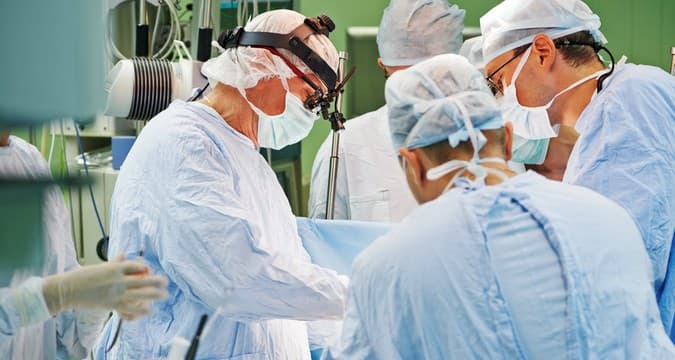Surgeons are doctors who diagnose and treat various pathological conditions that require surgical intervention. Surgeons also provide emergency medical care for traumatic injuries, burns, animal bites and other conditions requiring urgent treatment. This is one of the most physically demanding, responsible, and multifaceted medical specialties. The surgeons at GMS Hospital have many years of practice at well-known Russian and foreign clinics.
The attention of a specialist is required in various medical situations - from removing scars on the skin to treating complicated pathologies of the internal organs. Do not put off contacting a surgeon should any of the following symptoms appear:

Sign up for a consultation with a surgeon at GMS Hospital by phone or online, at a convenient time. For emergencies, we offer our patients the services of our own ambulance team.
The list of pathological conditions requiring a surgical approach to treatment is extensive. Surgeons treat diseases involving inflammatory and purulent reactions, tumor and tumor-like growths, and damage to skin, bones and soft tissues. Below are some of the disorders that are successfully treated by surgeons:
Surgical specialists at GMS Hospital perform both emergency procedures and elective surgery. The use of modern low-impact methods and technologies ensures the best clinical outcomes and significantly reduces the patient’s recovery time.
To confirm or clarify the diagnosis, surgeons have at their disposal an extensive array of laboratory tests and instrumental techniques, including:
You can complete a comprehensive series of tests in just 1–2 days. For medical emergencies, when surgical procedures must be performed as quickly as possible, all the necessary preoperative tests take no more than one hour.

Your first consultation with a surgeon does not require any complicated preparation. It includes the following steps:
The doctor will explain in detail all the nuances of the diagnosis and the chosen therapy, and provide very clear instructions to the patient. Depending on the test results, the doctor may require additional tests and consultations from other specialists.
The GMS surgery center performs nearly all types of operations.
The use of modern, low-impact microsurgical techniques minimizes our patients’ hospital stays to 1–2 days. Some surgical procedures are performed on an outpatient basis and do not require an overnight stay.
When designing the treatment plan, surgeons at GMS Hospital use a systematic approach, i.e. diagnostics, surgery and rehabilitation are carried out within the same medical institution. Thanks to the use of combined laser, radiowave and endoscopic operative technologies, patients stay at the clinic for a maximum of 1–2 days, and for outpatient procedures, 2–3 hours.
At the consultation, the surgeon assesses all of the patient’s medical parameters - their general condition, the results of the lab tests, and any contraindications - and decides on a course of treatment. If the patient’s medical condition requires immediate surgical intervention, he or she is immediately admitted for treatment and the operation is performed as soon as possible. For elective surgery, the doctor will set a date, give instructions for preoperative preparation. The surgeon will also design a rehabilitation program, and will closely observe the patient’s progress during the postoperative period. Sign up for a consultation with a surgeon at GMS Hospital, online or by telephone.
Our specialists will contact you